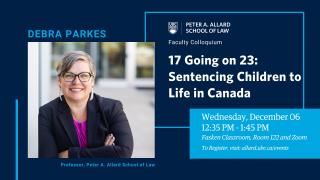Description of Event (Event Cancelled, will be rescheduled in term 2)
International human rights bodies have recommended the abolition of life sentences for children but these punishments remain legal in many countries, including Canada. In 2008, the Supreme Court of Canada recognized the presumption of diminished moral blameworthiness of young people as a constitutional principle of fundamental justice and overturned a law that presumed young people (those under 18) should be sentenced as adults for some serious crimes, including murder. The burden is now on the Crown to rebut the presumption and prove that a youth sentence would not be long enough to hold the young person accountable for their behaviour. For murder, the only available adult sanction is the mandatory life sentence, whereas the maximum youth sentence is 7-10 years, with no more than 4-6 of those years in custody. It was widely assumed at the time that adult sentences for youth would be rare.
This paper analyzes reported Canadian cases since 2008 in which young people were sentenced for murder and finds that imposing a life sentence is not rare; it is routine. The Crown regularly seeks life sentences for young people and the court orders them in more than two-thirds of the reported cases in which they are sought. These decisions provide a window on judicial conceptions of (White) childhood, (im)maturity, and accountability. They also display a lack of attention to the conditions of federal adult imprisonment and the evidence of its impact on young people, including the lifelong nature of a life sentence. The paper concludes with some thoughts on the normalization of this extreme punishment for youth and the need to revisit its constitutionality.
Please contact Michelle Burchill for the Zoom link.
Speaker
- Allard School of Law
- Research
- All Students
- Faculty
- Staff
- Research Talks

